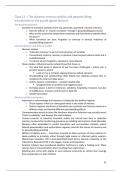Class 11 – The dynamic memory poli1cs and peacebuilding:
introduc1on to the puzzle (guest lecture)
Key guiding ques,ons
- Socie,es in transi,on contexts (from war, genocide, apartheid, colonial violence)
o How do ‘official’ or ‘master narra,ves’ emerge in peacebuilding processes?
o Who are the actors that shape these narra,ves and how do they mobilize them
for peace?
o What narra,ves are hear, forgoaen or silenced in various ini,a,ves of
peacebuilding projects?
Interdisciplinary and field of studies
- Memory studies
o ‘Collec,ve memory’ is part of reconstruc,on of socie,es
o Transcultural memory: memory is dynamic travel beyond na,onal state and is
mul,direc,onal
o It is about what is forgoaen, silenced or remembered
- Pease studies: influen,al works include those that focus on
o The idea that peace is absence of war has been challenged – where war is
present, peace is absent
§ Look at it as a complex ongoing process, hybrid, dynamic
o Peacebuilding and statebuilding oCen linked, but separate analysis fails to
recognize the local everyday peace
o Actors: owners vs beholders – complex rela,onship
§ Disagreements on posi,ve and nega,ve peace
o Everyday peace: is built on tolerance, solidarity, hospitality, inclusion, but also
of indifference, omission and tension in daily life
o Gender-just-peace
Memory poli,cs and peace
- Important to acknowledge that memory is shaped by the poli,cal regimes
o These regimes inherit or claim governance in the wake of violence
o Diverse regimes and forms of transi,on can constrain and harness memory in
different ways and toward different peacebuilding effects
- Commemora,ve events in place like Northern Ireland or Pales,ne may actually assert
‘limits to solidarity’ and deepen the confronta,on
- ‘chosen traumas’ or selec,ve trauma,c events are carried over ,me in collec,ve
memory, temporarily transferring grievance via retelling and memory ritual (Rwanda)
- Memory oCen embedded in par,al transi,ons and no-transi,on contexts, where
illiberal peacebuilders and authoritarian regimes constrict the nature of memory and
its peacebuilding poten,al
- Millions of dollars, euro, … have been invested to allow survivors of mass violence to
speak publicly or privately, either through legal means or informal jus,ce systems.
Well-known examples: TRC in post-Apartheid South Africa, Gacaca in Rwanda, at the
Tribunal for Rwanda (ICTR) in the Hague, Arusha and elsewhere
- Feminist scholars have ques,oned whether tes,mony is really a ‘talking cure’. Many
women face re-trauma,za,on when recalling their experiences
- Retelling also come with s,gma or even physical insecurity, as vic,ms fear revenge
from perpetrators or their families
51




